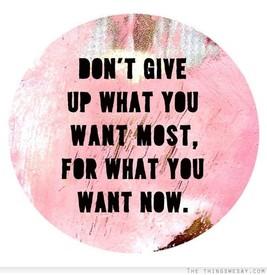Gaining weight and aggravated!!!

cherekac
Posts: 10 Member
I weighed myself this morning and I've gained 3 pounds and an inch around my waist. It's so aggravating. I've been eating under my calorie goal (with exercise) but seem to still gain weight. I don't understand it. I thought as long as I logged everything I ate and was under my calorie goal I would lose weight, right? What am I missing?? I'm 32 yrs old and weigh 191 - MFP had my daily goal as 1680. Since I gained 3 pounds I went reevaluate my goal settings and now it has me at 1710!!! I'm so confused. Am I correct in assuming that as long as you eat, or work out to go under your calorie goal, you should be losing weight instead of gaining? I'm so frustrated that I'm wasting so much time logging and counting to gain weight- I can do that without even putting in all this time!!!!
Sorry for the rant but I need some help- Thanks for reading :-)
Sorry for the rant but I need some help- Thanks for reading :-)
0
Replies
-
Are you using a scale for everything you eat? If not, start there. And do not eat all your calories back, not unless you are 100% sure they are correct, which you can usually not be sure about.0
-
The only possible way to be gaining weight while eating at a caloric deficit is if you're not measuring your food correctly or you are overestimating your calories burned from exercise. . . meaning you aren't ACTUALLY eating at a deficit but only THINK that you are. The body runs based on thermodynamics: energy in vs. energy out. You're calculations are incorrect somewhere.
Do you weigh your food? This is the most accurate way to meet calorie goals. 1 Tbsp of peanut butter vs. 16g of peanut butter look TOTALLY different. It's like this for a lot of foods. Some people pack ice cream into a 1 cup measure and others have it lightly scooped into it. They are both 1 cup of ice cream, but one will easily have an extra 50 or 60 calories.
When you measure yourself, is it always in the same spot? i.e. 1" above my belly button is where I measure. If I were to measure a right over my belly button, I would have "gained" an inch immediately.
Are you logging every, single thing that you're eating? Condiments on sandwiches? Do you log all of you food if there are days that you go over your calories? Do you allow yourself a "cheat" day where you don't log at all? These are common reasons people think they are in a deficit, but are still gaining weight.0 -
Are you using a scale for everything you eat? If not, start there. And do not eat all your calories back, not unless you are 100% sure they are correct, which you can usually not be sure about.
I've been using a scale to measure my serving sizes and don't eat the exercise calories back. I thought I had this all figured out but I'm at a lost.0 -
Weight fluctuation is a normal process.0
-
The only possible way to be gaining weight while eating at a caloric deficit is if you're not measuring your food correctly or you are overestimating your calories burned from exercise. . . meaning you aren't ACTUALLY eating at a deficit but only THINK that you are. The body runs based on thermodynamics: energy in vs. energy out. You're calculations are incorrect somewhere.
Do you weigh your food? This is the most accurate way to meet calorie goals. 1 Tbsp of peanut butter vs. 16g of peanut butter look TOTALLY different. It's like this for a lot of foods. Some people pack ice cream into a 1 cup measure and others have it lightly scooped into it. They are both 1 cup of ice cream, but one will easily have an extra 50 or 60 calories.
When you measure yourself, is it always in the same spot? i.e. 1" above my belly button is where I measure. If I were to measure a right over my belly button, I would have "gained" an inch immediately.
Are you logging every, single thing that you're eating? Condiments on sandwiches? Do you log all of you food if there are days that you go over your calories? Do you allow yourself a "cheat" day where you don't log at all? These are common reasons people think they are in a deficit, but are still gaining weight.
I have a Polar HRM to measure my calories burned. Maybe it's not as accurate as I think. I have a food scale and I measure portions. I weight myself once a week in the same spot (naked). Maybe I'm forgetting to log the extras somewhere. 'thanks for your help0 -
If you're gaining weight & inches, then you're not eating at a deficit. You're underestimating your food &/or overestimating your burns. Weigh your food. Eat back half your exercise calories.
Read this: http://www.myfitnesspal.com/topics/show/1080242-a-guide-to-get-you-started-on-your-path-to-sexypants0 -
If you're gaining weight & inches, then you're not eating at a deficit. You're underestimating your food &/or overestimating your burns. Weigh your food. Eat back half your exercise calories.
Read this: http://www.myfitnesspal.com/topics/show/1080242-a-guide-to-get-you-started-on-your-path-to-sexypants
I haven't been eating back any of my exercise calories. So there's a benefit to eating it back? Sorry if the questing seems dumb but I thought I was doing good with NOT eating them back :-)0 -
There is a great YouTube video that shows how off we can be in measuring foods with measuring cups compared to weighing. I hope someone will link to it in this thread -- I can't find it right now.
It was an eye opener for me to see how just being off a tiny bit, like oatmeal or peanut butter in their examples, can mean no deficit of calories for the day/week.0 -
Your MFP calorie goal is your activity level minus your deficit (500 calories = 1 lb. per week). It does not include your exercise, so you must eat back at least a portion of your exercise calories. The calorie counts & burns are estimates, so some people eat back half their calories to reduce the margin of error.I haven't been eating back any of my exercise calories. So there's a benefit to eating it back? Sorry if the questing seems dumb but I thought I was doing good with NOT eating them back :-)
TDEE includes exercise, so people who customize their calorie goal (for example, TDEE -20%) don't eat back their exercise calories. That would be double dipping.
Weight loss takes a whole lot of trial & error to find what works for you.0 -
3 pounds is a normal daily fluctuation.
How long have you been doing this/ What's your exercise routine? Did you eat something with a lot of salt like a Chinese meal?0 -
WIll you open your diary?0
-
How often are you weighing in and taking measurements? Three pounds and an inch don't necessarily mean anything. I can get bigger swings than that overnight.0
-
This question is going to be incredibly personal but...here it goes.....How often do you poop? How much do you poop? I can gain 3 lbs and an inch around my waist if I have not taken a good poo in a few days. I have IBS so it happens to me often.
Also, are you close to your period? We gain water weight in that area when we are getting ready to start.
Dont give up.
L0 -
I notice that MFP calorie goals are deceptively high. I weighed almost as much as you when I started my latest weight loss program. I've lost about 16lbs in the last 6 weeks by eating 1200-1400 calories a day (but trying to stay closer to 1200 or less) and NOT adding more calories to my daily allowance if I work out - typically every day. MFP also grossly over-estimates the amount of calories you burn off in a work out. So allowing MFP to determine how much you need to eat and how much more you can eat when you exercise is probably what's undermining your weight loss efforts.
Hang in there and focus on healthy food, exercise and the health benefits from making positive choices. The weight loss will follow. Good luck!0 -
I notice that MFP calorie goals are deceptively high. I weighed almost as much as you when I started my latest weight loss program. I've lost about 16lbs in the last 6 weeks by eating 1200-1400 calories a day (but trying to stay closer to 1200 or less) and NOT adding more calories to my daily allowance if I work out - typically every day. MFP also grossly over-estimates the amount of calories you burn off in a work out. So allowing MFP to determine how much you need to eat and how much more you can eat when you exercise is probably what's undermining your weight loss efforts.
Hang in there and focus on healthy food, exercise and the health benefits from making positive choices. The weight loss will follow. Good luck!
:noway:
Most people find that MFP calorie goals are too low (but a lot choose improper goals and activity levels too).
1200-1400 calories a day isn't for everyone. It is too low for a lot of people, particularly for active people, especially if you aren't factoring in exercise.
16lbs in 6 weeks is a huge amount. Not a realistic expectation for many people. There are a lot of us who advocate for moderate calorie deficits and modest weight loss goals for a good many reasons, preserving LBM for one. Long term sustainability is another. And making it easier to move to and maintain during maintainence.
ETA- some of the exercise entries can be inflated, but even HRMs can be inflated. Some poeple choose to eat a portion of their exercise calories instead of all of them or switch tot he TDEE methods.
Since OP isn't adding back in her exercise calories, I'm thinking that isn't a factor in this.0 -
MFP also doesn't take into account age - I used to be able to eat a lot more, but now if I eat more than 1200 calories/day and fail to exercise, I gain weight - fast. I've had thyroid tests and physicals and I'm very healthy, just hit menopause. But I refuse to be fat any longer - it's awful. Besides, right now, I'm in a weight loss contest that I'm hoping to win. Afterwards, I'll start weight lifting again and pick up healthier habits.
It sounds like the poster doesn't have the calorie deficit she needs to reach her goals and MFP is not as hard core as she is or is not calculating her needs correctly. So, yeah, if you have time, moderation is probably healthier but I was trying to lose weight prior to the contest and doing the moderation thing and everything the "right" way and that wasn't working for me either. Maybe she wants to just get it off THEN work on maintenance. That way is easier and less frustrating for me too.0 -
MFP also doesn't take into account age - I used to be able to eat a lot more, but now if I eat more than 1200 calories/day and fail to exercise, I gain weight - fast. I've had thyroid tests and physicals and I'm very healthy, just hit menopause. But I refuse to be fat any longer - it's awful. Besides, right now, I'm in a weight loss contest that I'm hoping to win. Afterwards, I'll start weight lifting again and pick up healthier habits.
It sounds like the poster doesn't have the calorie deficit she needs to reach her goals and MFP is not as hard core as she is or is not calculating her needs correctly. So, yeah, if you have time, moderation is probably healthier but I was trying to lose weight prior to the contest and doing the moderation thing and everything the "right" way and that wasn't working for me either. Maybe she wants to just get it off THEN work on maintenance. That way is easier and less frustrating for me too.
MFP does account for age. I just changed mine and left everything else the same, mine changed.0 -
MFP uses your activity level, age, sex, height & weight to calculate your calorie goal, then subtracts the appropriate deficit for your weight-loss goal (250 calories per .5 lb.).MFP also doesn't take into account age - I used to be able to eat a lot more, but now if I eat more than 1200 calories/day and fail to exercise, I gain weight.
^^^This.16lbs in 6 weeks is a huge amount. Not a realistic expectation for many people. There are a lot of us who advocate for moderate calorie deficits and modest weight loss goals for a good many reasons, preserving LBM for one. Long term sustainability is another. And making it easier to move to and maintain during maintainence.
OP, with 8 lbs. to go you need to set your goal to .5 lb. per week and be patient. The closer you are to goal, the more slowly you lose.0 -
3 pounds is a normal daily fluctuation.
How long have you been doing this/ What's your exercise routine? Did you eat something with a lot of salt like a Chinese meal?
Been doing this for 3 weeks..I run on treadmill and light weights....and I actually did eat Chinese.... maybe that's it0 -
3 pounds is a normal daily fluctuation.
How long have you been doing this/ What's your exercise routine? Did you eat something with a lot of salt like a Chinese meal?
Been doing this for 3 weeks..I run on treadmill and light weights....and I actually did eat Chinese.... maybe that's it
Um that's probably exactly it. Chinese is often very high in sodium and eating more sodium that usually can result in water retention. Eat your normal food and drink some water. It should even out in a day or two.0
This discussion has been closed.
Categories
- All Categories
- 1.4M Health, Wellness and Goals
- 398.2K Introduce Yourself
- 44.7K Getting Started
- 261K Health and Weight Loss
- 176.4K Food and Nutrition
- 47.7K Recipes
- 233K Fitness and Exercise
- 462 Sleep, Mindfulness and Overall Wellness
- 6.5K Goal: Maintaining Weight
- 8.7K Goal: Gaining Weight and Body Building
- 153.5K Motivation and Support
- 8.4K Challenges
- 1.4K Debate Club
- 96.5K Chit-Chat
- 2.6K Fun and Games
- 4.8K MyFitnessPal Information
- 12 News and Announcements
- 21 MyFitnessPal Academy
- 1.5K Feature Suggestions and Ideas
- 3.2K MyFitnessPal Tech Support Questions









